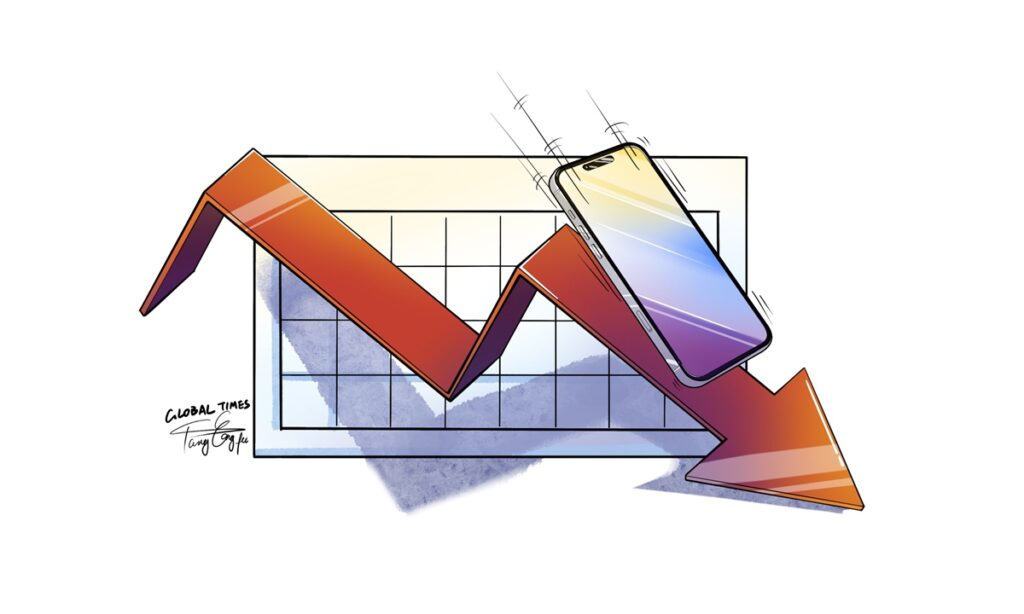US tech giant Apple planned to offer a discount of 700 yuan ($103) for all iPhone 14 Pro models in China starting from Sunday, Chinese media outlets reported, citing an internal document of SUNPIE, an Apple authorized dealer. On some e-commerce platforms like JD.com, price cuts for iPhone 14 Pro could even reach as much as 800 yuan.
The price cut came just a few days after the US tech giant released a disappointing financial report for the last quarter of 2022. Due to disappointing iPhone sales, which accounted for a majority of its revenue, Apple raked in $117.2 billion in revenue in the financial quarter ending December 25, down 5 percent from the same period in 2021 and the first year-on-year decline since 2019, according to Forbes.
Since price cuts are often the most effective means of boosting sales, Apple’s plan in China this time could be seen as part of its efforts to bolster its competitiveness at a time when its smartphone sales growth starts to falter amid increasingly fierce market competition.
Clearly, Apple just had a rough year in 2022, with its stock suffering the worst performance since 2008 by losing 27 percent. The sluggish stock performance was mainly because the demand for the iPhone 14 fell short of investors’ hopes. The overall decline in global smartphone shipments may play a role in iPhone’s disappointing sales. In 2022, global smartphone shipments fell 11.3 percent year-on-year to 1.21 billion units, marking the lowest level in a decade, according to an IDC report.
However, it is important to note that the high-end smartphone market still maintained a robust growth momentum last year. In other words, with other smartphone brands like Huawei, Samsung, Vivo, and Xiaomi witnessing rapid growth in high-end shipments, Apple saw a decline in market competitiveness.
While China remains an important market for smartphones and other consumer electronics, a growing trend is that as the scale and industrial chain advantages of Chinese manufacturing enabling Chinese companies to improve their competitiveness, US tech giants such as Apple will have to face up to the challenges of a more competitive Chinese market.
Even though Chinese high-tech companies such as Huawei are currently subject to Washington’s political crackdowns, the pace of technological advances by Chinese brands in the smartphone sector has actually accelerated, instead of slowing. Chinese firms are also exploring or setting new market trends. For instance, so far, nearly all of China’s major smartphone brands have launched foldable smartphones, but Apple has not made any significant changes to its offerings.
Nevertheless, it should be noted that Apple’s sales in China remain high. Over the past decade, Apple has gradually seen increasing concentration of its product lines and supply chains in China, a natural result of China’s economic and technological development as well as its massive consumer market. Apple’s success in the Chinese market has been driven by growing demand from Chinese consumers, while its supply chains in the country have led to rapid development of technological innovation and market application research of Chinese companies.
In this sense, the Chinese market and the Chinese supply chains will be crucial if Apple wants to improve its competitiveness. But if Washington continues to step up the so-called “decoupling” push, it will certainly affect Apple’s future development.
Indeed, it is not just Apple that has reported disappointing sales result recently. Other US tech giants have also reported disappointing performances. Intel warned investors of a bleaker-than-expected outlook. Tesla slashed prices globally. All of these companies’ lackluster growth projections point to a future of weak global consumer demand, underscoring the lack of rationality in the US’ tech war against China.
Washington’s attempt to politicize supply and industrial chains under the “decoupling” push have taken its toll on US businesses. US technology sanctions against China have not only intensified competition among US companies but also weakened the competitiveness of US technology products in the Chinese market when compared with Japanese, South Korean and European products.
Moreover, such an vicious attempt won’t change the reality that the largest downstream market of consumer electronics and other high-tech products lies in China. It will not stop China’s economic and technological rise, as US politicians wanted. Anyone who defies economic laws will eventually swallow the bitter pill.
(Global Times)




